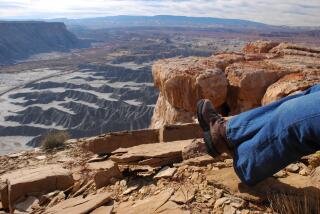Column: Zinke may soon be gone from the Interior Department, but his successor could be much, much worse
As a chapter in the lesson plan instructing you to be careful what you wish for, let us consider the case of Interior Secretary Ryan Zinke and the ever-increasing possibility that he soon will be ousted over ethics concerns.
Last week, President Trump said that Zinke’s job was safe — for the moment. But his tenure at Interior plainly is perched on a knife edge. His departure would remove from the Cabinet a member devoted to environmentally dubious oil drilling, to wasteful and foolish water projects and to feathering his own nest.
That prospect warrants taking a close look at his likeliest successor, Deputy Secretary David Bernhardt. And to the possibility that, compared with Zinke, Bernhardt will be much, much worse.
(Deputy Secretary Bernhardt) acts in accord with his ethics agreement ... not the opinion of rabid advocates whose primary purpose is character assassination.
— Interior Department spokeswoman Faith Vander Voort
Zinke’s departure isn’t a done deal, and there’s been no indication that if he’s ousted, Bernhardt’ will necessarily be his successor. But it’s proper to keep Bernhardt’s career in perspective as an example of the Washington revolving door made flesh.
Bernhardt was a lawyer at the firm Brownstein Hyatt Farber Schreck, which represented companies in the oil, gas, mining and agriculture industries, when he was first appointed to the Interior Department by President George W. Bush in 2001.
When the Obama administration took office in 2009, Bernhardt returned to the Brownstein firm. There his client roster included pantloads of entities with current or potential cases within Interior’s jurisdiction. As my colleague Bettina Boxall reported, Brownstein Hyatt sued Interior four times on behalf of California’s Westlands Water District, the nation’s largest irrigation district. And Bernhardt personally argued one case challenging endangered species protections for California salmon.
Despite these potential conflicts — or perhaps in recognition of them — President Trump named Bernhardt deputy Interior secretary in late 2016. He was confirmed in July 2017, and promptly filed a disclosure letter listing 22 firms or individuals on whose cases he would have to recuse himself at least until mid-2019, according to executive branch policy.
He also filed a financial disclosure revealing that he had collected $953,085 as a partnership distribution upon leaving the Brownstein firm to take up his government post.
Since then, however, questions have persisted over whether Bernhardt really has kept his nose out of issues dear to the hearts of his former clients. One problem is that the connections between agency policies, Bernhardt’s role and the benefits to his former clients aren’t always direct or crystal clear.
In August, for instance, Bernhardt produced an op-ed for the Washington Post that amounted to a broadside against the Endangered Species Act, the law over which he had sued Interior on behalf of Westlands. Bernhardt’s advocacy of a rollback of the law, as we observed at the time, would sit very warmly within the hearts of Westlands and other former clients.
An Interior spokeswoman responded furiously to my question about whether the op-ed bespoke a conflict of interest for Bernhardt. “This question is outrageous,” Deputy Press Secretary Faith Vander Voort emailed me. She said Bernhardt “is completely compliant with his ethics agreement and he takes it very seriously. The Administration’s interest in improving the Endangered Species Act is significant and it is irresponsible to insinuate that it was driven by the Deputy Secretary’s prior employment.”
Environmental and progressive land-use groups have kept a weather eye on Bernhardt’s activities and the fortunes of his former clients. What they’ve seen isn’t comforting. According to the Western Values Project, a progressive-funded Montana organization that has sought records relating to Bernhardt’s activities through Freedom of Information requests to the Interior Department (and says it’s received the cold shoulder in return) alleges in a lawsuit filed last month that many of Bernhardt’s former clients “began receiving sudden and dramatic windfalls only months since his swearing in.”
One is Cadiz Inc., the developer of a putative water storage project in the Mojave Desert that paid the Brownstein firm $2.75 million in lobbying fees and 200,000 shares of stock while Bernhardt was at the firm; Scott Slater, a Brownstein attorney, currently serves as the Cadiz CEO. Within months of Bernhardt’s confirmation, Interior withdrew legal rulings adverse to Cadiz, giving the water project a new lease on life despite years of findings that it’s essentially useless and environmentally damaging. Cadiz is on Bernhardt’s recusal list.
The Independent Petroleum Assn. of America, another outfit on Bernhardt’s list, benefited when Interior took steps to revise government agreements protecting the sage grouse. Did Bernhardt have a hand in this action? The IPAA certainly seems to think so. In March it joined nine other oil and gas industry groups to thank Bernhardt personally.
The Western Values Project also notes that Bernhardt has “led policy on development of the Alaskan National Wildlife Refuge” even though he had been the lead attorney for the state of Alaska in a 2016 lawsuit seeking an exploration permit for ANWR. As the lawsuit observes, Bernhardt has pushed for streamlined government reviews of exploration permit requests, describing the drawn out process for considering them as “just nuts.”
Interior spokeswoman Vander Voort responded to the project’s assertions in the same tone as her earlier statement: “Deputy Secretary Bernhardt,” she told me by email, “takes his ethical responsibility very seriously, acts in accord with his ethics agreement and the advice he seeks and receives from ethics officials, not the opinion of rabid advocates whose primary purpose is character assassination.”
But that’s not the end of Bernhardt’s potential conflicts. The Trump administration has been pushing hard for an enlargement of Shasta Dam in Northern California, despite the opposition of state officials and state law prohibiting the project. The expansion would come under the jurisdiction of the federal Bureau of Reclamation, which is part of Interior and therefore within Bernhardt’s authority. Who would this project benefit? Big water districts, notably Bernhardt’s former client, Westlands.
According to the murky tradition’s governing Washington ethics violations, Zinke’s error isn’t that he may be dishonest, but that he’s obvious — his fingerprints on alleged conflicts of interest are too easy to detect.
Bernhardt’s putative conflicts all have the virtue of deniability. At least one or two steps separate Interior actions from benefits flowing to his former clients, so who can say that he’s violating his explicit promises to recuse himself? But that deniability could make an Interior Secretary Bernhardt much more dangerous than the hapless Secretary Zinke.
Keep up to date with Michael Hiltzik. Follow @hiltzikm on Twitter, see his Facebook page, or email [email protected].
Return to Michael Hiltzik’s blog.
More to Read
Sign up for Essential California
The most important California stories and recommendations in your inbox every morning.
You may occasionally receive promotional content from the Los Angeles Times.











